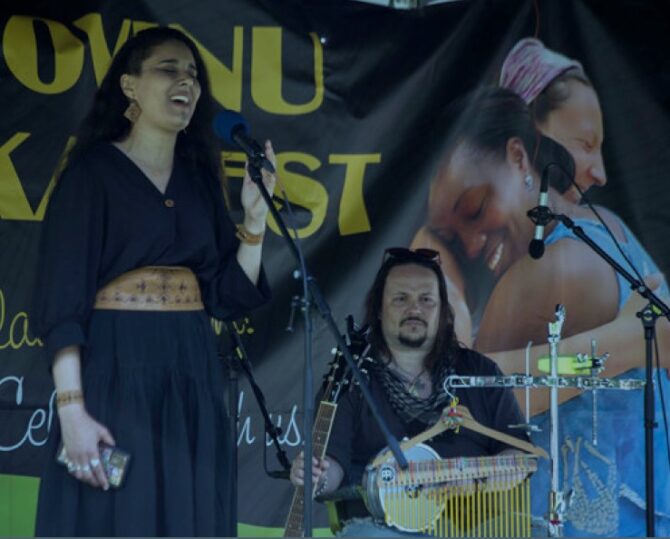Interview on Psychiatric Care in Czechia
photo: AMIGA’s website How is the psychiatric care in Czechia provided and who should you…
More

Source: Bulletin Slovo II/2022 | Text: Lucie Němečková | Photo: Irena Vodáková
This year’s 18th edition of (not just) theatre sessions Creative Africa or We Are All Africans had two parts. During the festival prologue on 26th and 27th April, the organisers from the Komba association in cooperation with FAMU (Film and TV School of Academy of Performing Arts in Prague) paid tribute to Jean Rouch, French filmmaker and anthropologist who ‘made it possible for cinema to take new directions and brought a new perspective on Africa and the world of images’. These were the words used by Andrea Paganini, an expert on Rouch’s work, who, together with David Cenk, an expert on African cinema, presented two films by Rouch in Prague and Olomouc: Horendi, a wordless document depicting a ritual of possession of two women in Niamey, Niger, and Babatu and the Three Councils, the only Rouch’s historical film which depicts a 19th century war epic about a chief named Babatu who conquered Gurunsi lands and prospered through the slave trade. This film, based on a script by Nigerian historian, writer and politician Boubou Hama, is still relevant today. The film was awarded the Palme d’Or at the 1976 Cannes Film Festival.
From 19th to 24th May, the 18th Creative Africa welcomed theatre artists from Africa, the Caribbean and Europe in Prague, Brno, Hradec Králové, and Pilsen.
The opening of the festival, which has long been supported by the State Fund for Culture and the City of Prague, took place at the Václav Havel Library with a theatrical performance of Havel’s Audience performed by actors from Jos Repertory Theatre. What makes this ensemble from Jos, Nigeria unique is that it specialises in Czech dramaturgy. Apart from Havel, their repertoire also includes Erben’s Bouquet or Cimrman’s The Conquest of the North Pole and Čapek’s RUR.
Of course, authors from Martinique could not miss this year’s festival either. Véronique Kanor is a renowned playwright, documentary filmmaker and a devotee of pict dub poetry, who has performed for example with rapper Abd Al Malik. Her poetic yet cutting play about identity, slavery, racism, women The Sea Was Heaven’s Accomplice was translated into Czech by Kateřina Neveu. There was a staged reading of this play directed by Akram Staněk and performed by Jitka Smutná. The second guest from Martinique was Ali Babar Kenjah – na independent sociologist, Rastafarian and poet. His historical play Samuel or the Night of the Free brought a new perspective on the time of slavery. Kenjah draws on a half-remembered history, the slave uprising in Martinique on Christmas Day 1830, which preceded the abolition of slavery. This docudrama was translated into English by Matylda Lázňovská and Michal Lázňovský and directed by Filip Jan Zvolský with the actors of the Apropo Theatre. The reading of both plays took place on a symbolic day, Sunday 22nd May, which is when slavery was abolished in Martinique 174 years ago.
This year, the popular pan-African Benso celebrations took place at the Old Burgrave’s House in Vyšehrad. This time it took form of a charitable event and it was carried out in a slightly different style. There was African music, dancing, a fashion show, a fairy tale, workshops for children, stands with refreshments and handicrafts, and peace and quiet. It was all organised in collaboration with the Narovinu Centre, who has been celebrating 20 years of their meritorious project Distant Adoption.
The very end of the festival belonged to Greg Germain, who comes from Guadeloupe and was one of the first dark-skinned actors who became French TV stars. In Prague and Brno, we joined him in retracing the steps of his memory, in search of the Francophone authors who have influenced his life and career, such as Patrick Chamoiseau, Edouard Glissant, Derek Walcott, Edmond Rostand, Victor Hugo… Together with his wife, producer Marie-Pierre Bousquet, the outstanding film and theatre actor runs the Chapel of the Incarnate Word, a well-known theatre in Avignon focused on Afro-Caribbean dramaturgy. In Prague, Greg Germain presented two of his film productions of stage plays from this theatre: They Call You Venus and Bintou. In the first of these, the outstanding Guadeloupean dancer and choreographer Chantal Loïal pays tribute to the woman they called the Venus of Hottentot, who suffered enormous humiliation during her lifetime and never found peace even in death when her skeleton was put on public display. Bintou is an award-winning play by contemporary French-Ivorian playwright Koffi Kwahulé. The plot takes us into the poetically cruel world of a big-city suburb and introduces Bintou, an irrepressible 13-year-old heroine who dreams of a career as a belly dancer, commands a boy gang and rebels against all authority.
photo: AMIGA’s website How is the psychiatric care in Czechia provided and who should you…
Moresource: ICP web page Valid from April 11, 2026. 4. From April 11, 2026, the…
Morephoto: AMIGA’s website How is the psychiatric care in Czechia provided and who should you…
Moresource: ICP web page Valid from April 11, 2026. 4. From April 11, 2026, the…
More